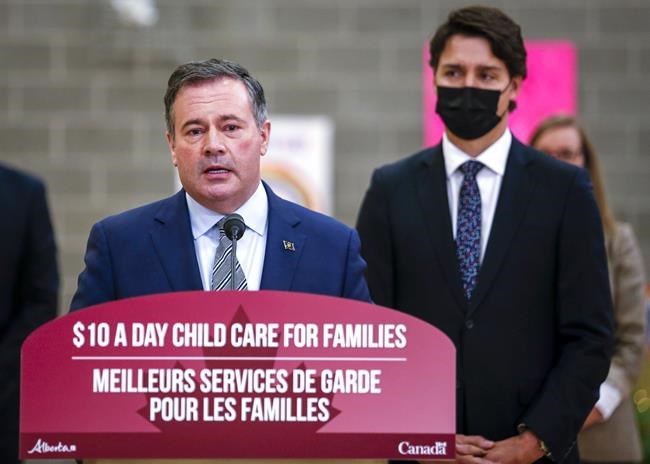OTTAWA — Alberta Premier Jason Kenney warned the federal government on Monday that it must consult with the provinces as Ottawa moves on plans to implement a cap on emissions from the oil and gas sector.
The warning came during a rare appearance between Kenney and Prime Minister Justin Trudeau as Alberta became the latest province to agree to participate in a national child-care program.
The two leaders sought to downplay their long-standing differences during a news conference in Edmonton announcing the child-care deal after Alberta spent months holding out alongside Ontario and New Brunswick, which still don’t have an agreement.
Yet Trudeau and Kenney struck distinctly strident tones when asked by reporters about the prime minister's announcement at the UN climate change talks in Scotland two weeks ago that Canada would start working on the long-promised emissions cap.
After Trudeau promised federal officials would consult industry, experts and scientists as it develops the cap, Kenney took issue with the prime minister’s failure to include provinces in the list of interested stakeholders.
“The provinces own the resource, and under the Constitution, the provinces regulate the development of those resources,” Kenney said in response to a reporter’s question as Trudeau and Deputy Prime Minister Chrystia Freeland looked on.
“So I will underscore the importance of collaboration. When it comes to finding a balance between jobs and growth and reducing emissions, I think we can find a suitable approach.”
Trudeau did not specifically respond to Kenney's comments, but did insist all parts of the economy will need to do their part if Canada is to reach its emissions-reduction targets by 2030 while encouraging economic growth in clean energy and other sectors.
In July, Canada formally submitted to the UN its new target, which aims to reduce emissions by 40 to 45 per cent below 2005 levels by 2030. The previous target was a 30 per cent reduction by 2030.
“Canada doesn't reach our 2030 targets unless everyone is part of it,” the prime minister said on Monday.
“And we need the innovation, the hard work, the leadership, the science, the knowledge of Albertans and folks in the oil and gas sector across the country to be part of figuring out how we move forward.”
The cap had been promised in the Liberals' recent election platform, with plans to force emissions down until they hit net zero in 2050. A lack of regulations for the sector has long been a sore spot between environmental groups and Ottawa.
Some environmental groups have since said the government should focus on cutting production from the oil and gas sector rather than reducing emissions through long-term targets and unproven technologies such as carbon capture and sequestration.
Kenney, however, held up carbon capture, hydrogen energy and liquefied natural gas as ways to reduce emissions, adding: “We are willing to be partners as long as there is a future for the largest sector of the Canadian economy. That is our energy sector.”
This report by The Canadian Press was first published Nov. 15, 2021.
Lee Berthiaume, The Canadian Press
Note to readers: This is a corrected story. A previous version said Prime Minister Justin Trudeau announced his promised cap on emissions for Canada's oil and gas sector at the United Nations climate change talks in Scotland last week. The announcement came Nov. 1.




